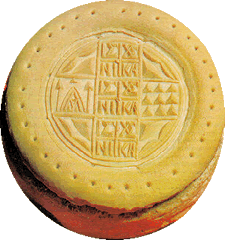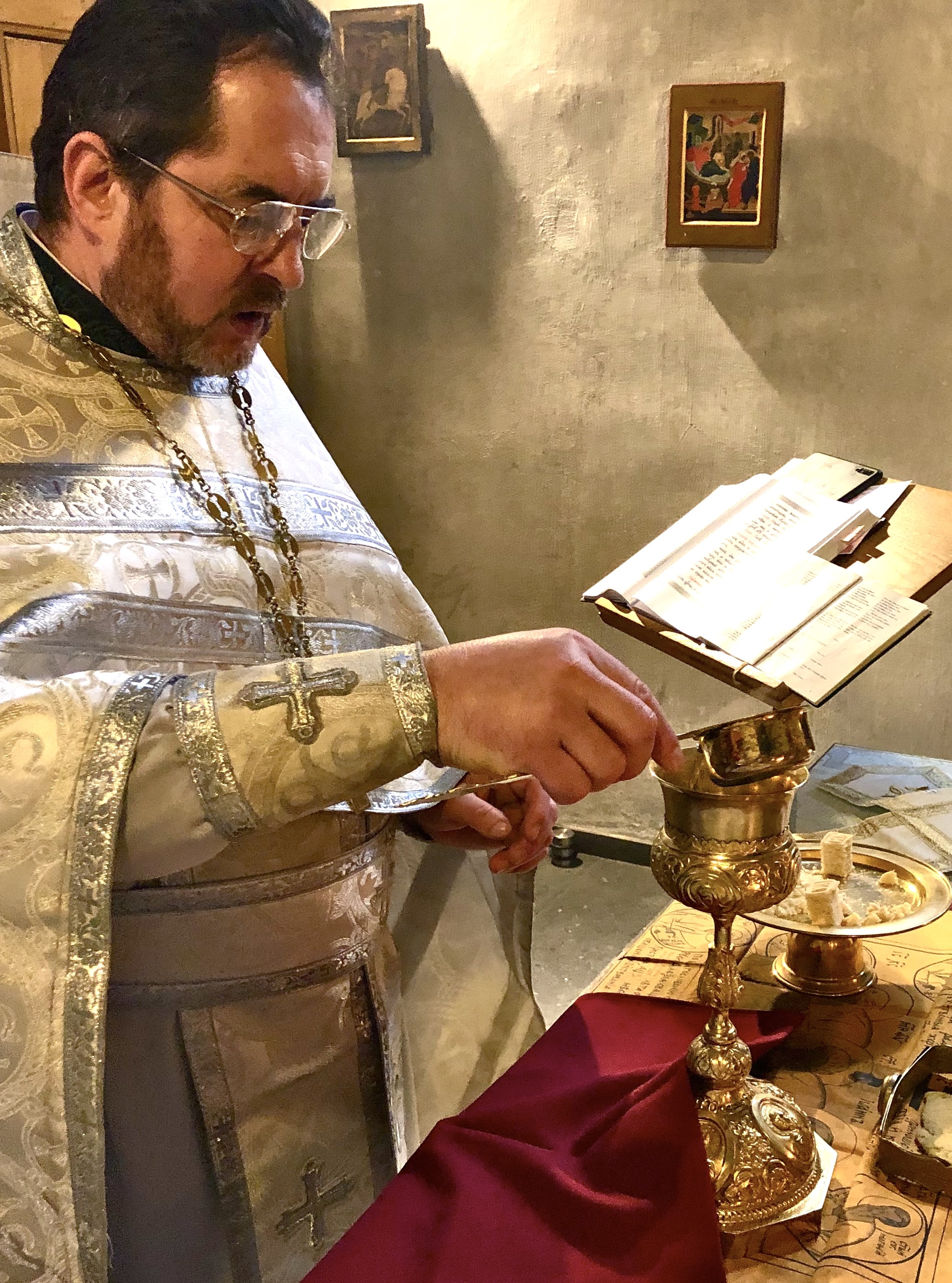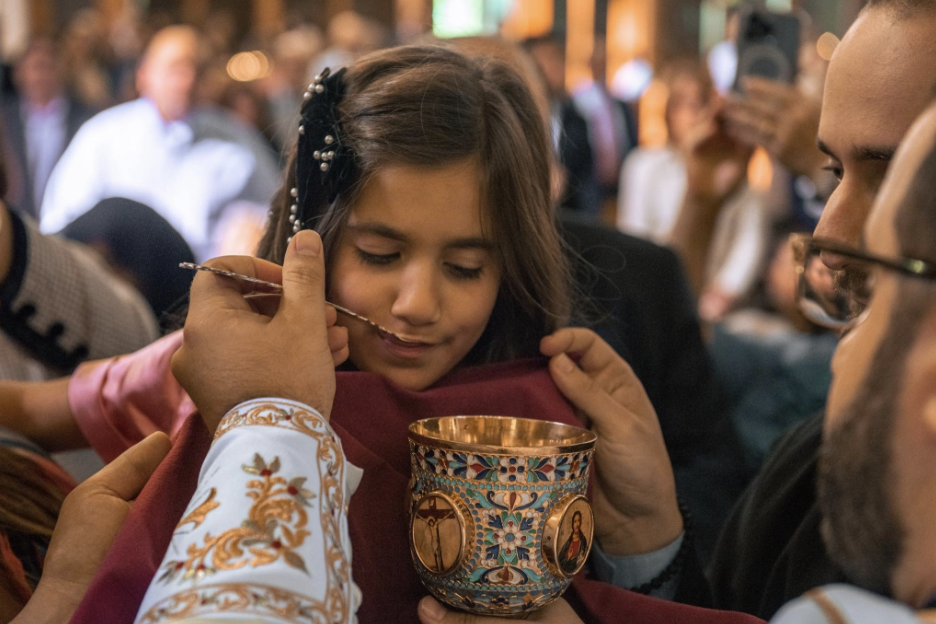Receiving Holy Communion
We have now arrived at the part of the service that is the reason we came. We are about to participate in union with God through His most precious gift of his Blood and Body that He gives to us for the forgiveness of our sins and eternal life.
Unfortunately many come to the service without preparing themselves to participate in this crowning awesome event. Some routinely participate out of obligation only on major feasts days a couple of times a year. But in his next exclamation the priest tells us that these gifts are for the "holy people of God." We cannot participate without proper preparation and is it our duty to always be prepared. It is not proper to partake out of obligation or habit nor is it proper to routinely come the the Liturgy unprepared to participate.
Saint John Chrysostom says,
...Many are those who partake of the immaculate mysteries once a year, while others twice and others many times. Whom shall we accept? Neither those who partake of Holy Communion once a year, nor those who partake of It many times, nor those who partake of It a few times, but those who partake of the immaculate Mysteries with a clean conscience, a clean heart and impeccable life. All those who are clean, may always draw near the holy Cup, whereas those who are unclean may not draw near even once. for they are given their own condemnation and disapproval and hell and punishment...
All of us - clergy and laity - should have good souls, a heart that is totally pure, and understanding that is illuminated and a countenance that should shine with Divine Grace... Whoever is like this, may draw near and may touch the royal Cup the celebrant is holding... let no one who remains sinful and unrepentant draw near. (G.C.F. 19 p 486)
At this point in the service the deacon calls us to be attentive. The priest, raising the holy Body of Christ, then calls those who are prepared to participate. This elevation of the "Lamb", the Body of Christ, is seen by some as symbolizing Christ's soul being raised from Hades, releasing a multitude of Righteous; His soul then being reunited with the Resurrected Body.
The priest proclaims with
strength:
The Holy Gifts, for the Holy people of God.
The Congregation then voices the sentiments and their humility and sing:
One is Holy, one is Lord; Jesus Christ, to the Glory of God the Father. Amen.
Breaking of the Bread
It is necessary to break the "lamb" into four parts and then into smaller pieces so that everyone can participate in communion with God. This is referred to as the Breaking of the Bread
We have seen from the preparation or Prothesis that the center part of the Prosforon, which is cut and placed on the Diskarion has the following letters:

Interpreted these letters mean:
IC = contraction for Jesus (Ιησους)
XC = contraction for Christ (Χριστός)
NIKA = conquers
"Jesus Christ conquers"
The Priest takes this cube of Holy Bread (the center portion), which has been carved in the form of the Cross, but not broken, and breaks it into the four parts, saying inaudibly:
Broken and distributed is the Lamb of God; broken but not divided; always eaten, yet never consumed, but sanctifying those who partake.
Taking the piece marked IC, and making the sign of the Cross over the Holy Chalice, he drops it in saying quietly:
The fullness of the Cup of the Faith, of the Holy Spirit. Amen.
The Lamb of God is divided and distributed, yet It is not disunited. Even though the portion that each receives may be small, nevertheless, the whole Body of the Lord Who sacrificed His life on the Precious Cross for the salvation of the whole world is imparted to us. In each small piece that a communicant receives, whenever and wherever, is our Lord in His fullness. He is forever consumed by the Faithful, but never used up and always sanctifies those who partake thereof.
By uniting the Body and Blood in the holy Cup, the unity of Jesus Christ's nature is proclaimed: perfect God and perfect man. It is a union between the Sacrifice on the Cross and divine Grace, which is offered to the faithful through Holy Communion.
 When
the celebrant unites the Body and Blood of Christ, he is
given some very hot water in a small container called
"Zeon," brought by an altar boy. It is blessed
and the hot water is poured into the Holy Chalice.
Saint Nicholas Cabasilas tells us that it is hot because
it reveals the Holy Spirit that is also called "water" and
appeared as fire that "sat upon each of" Christ's
disciples during Pentecost. (P.G. 150,
452, A, B). It is also a remembrance of the
blood and water that came from the piercing of Christ's
body on the Cross.
When
the celebrant unites the Body and Blood of Christ, he is
given some very hot water in a small container called
"Zeon," brought by an altar boy. It is blessed
and the hot water is poured into the Holy Chalice.
Saint Nicholas Cabasilas tells us that it is hot because
it reveals the Holy Spirit that is also called "water" and
appeared as fire that "sat upon each of" Christ's
disciples during Pentecost. (P.G. 150,
452, A, B). It is also a remembrance of the
blood and water that came from the piercing of Christ's
body on the Cross.
The Priest blesses the water saying:
Blessed is the fervor of Thy Saints, always: now and forever, and from all Ages to all Ages. Amen."
Pouring the water into the Chalice he repeats:
The fervor of Faith, full of the Holy Spirit. Amen."
The Clergy Receive the Holy Communion
Then reverently and full of faith, the Priest recites the following prayers before receiving Holy Communion as follows:
I believe, O Lord, and I confess, that Thou art verily the Christ, the Son of the Living God, Who didst come into the world to save sinners, of whom I am the first. Also I believe, that This is Thy Sacred Body, and This Thy Precious Blood. Therefore I pray Thee; have mercy upon me and pardon my transgressions, voluntary and involuntary, in word and in deed, both known and unknown, and make me worthy to partake of Thy Sacred Mysteries, unto the remission of sins and unto Life Eternal. Amen.
Into the magnificence of Thy Saints, how shall I, your unworthy and unprofitable servant enter? For should I also dare to enter the Festal Chamber, my robe betrays me, for it is not a festal garment, and I shall be bound and cast out by the Angels. Cleanse my soul, O Lord, from pollution, and by Thy compassion save me.
O merciful Master, Lord Jesus Christ my God, let not these Holy Gifts be unto me for judgment through my unworthiness, but rather for the purification and sanctification of my soul and body, and as an earnest of the Life and Kingdom to come. For it is good for me to cleave unto God and to place in the Lord the hope of my salvation.
Receive me today, O Son of God, as a partaker of Thy Mystical Feast for I will not speak of the Mystery to Thine will not kiss Thee as did Judas, but as the Thief, I will confess Thee: Lord, remember me when Thou comest in Thy Kingdom.
The Priest prepares to receive by saying:
Behold, I draw near to Christ, our immortal King and God.
Taking the piece marked 'XC' and before consuming it he says quietly:
To me (name), the unworthy Priest, is given the most Holy and Precious Body of our Lord, and God and Savior Jesus Christ, for the remission of my sins, and unto Eternal Life.
Taking the sponge he wipes his fingers carefully in order that even the tiniest particle of Holy Bread is off and into the Chalice.
He then picks up the Holy Chalice and before drinking from it he repeats:
Wiping his lips with the communion cloth, he kisses the Chalice and says:The most Holy and Precious Blood of our Lord, and God and Savior Jesus Christ is given to me (name), the unworthy Priest, for the remission of my sins, and Eternal Life.
This hath touched my lips and my iniquities shall be taken away, and my sins cleansed." (Isaiah, Chapter 6, Verse 7)
Then taking the portions marked NI and KI, he places them into the Holy Chalice, from which the Faithful will shortly receive. In doing this, he recites an exultant praise of the Resurrection, as follows:
Having beheld the resurrection of Christ, let us adore the Holy LordJesus, the only sinless One. We worship Thy Cross, O Christ, and Thy Holy Resurrection we praise and glorify; for Thou art our God, and we know no other than Thee; we call on The Name. O come all ye faithful, let us worship Christ's Holy Resurrection. For behold, through the Cross joy has come to all the world. Ever blessing the Lord, we praise His Resurrection. By enduring the Cross for us He destroyed death by death.
The Chalice and the Diskarion are then covered with the veils as the Priest recites the Prayer of Thanksgiving:
We thank Thee, O Merciful Master and Benefactor of our souls, that Thou hast this day vouchsafed to give us Thy Heavenly and Immortal Mysteries; Direct us into the right way; strengthen all of us in Thy fear; watch over our life; make safe our endeavors, through the prayers and supplications of the glorious Theotokos, and Ever-Virgin Mary, and of all Thy Saints.
Congregation receives the Holy Communion
Finally, the priest or the Deacon announces to the congregation:
With the fear of God, faith and love, draw near.
The people come forward prayerfully and orderly. As we come to commune, we should sense this trembling in fear and awe, a fear that comes from extreme respect and reverence for the Triune God, not one with anxiety, but with the faith Christ himself revealed to us.
This fear is not the same as that of a person who is terrified of losing money, health or a job. It is a noble sentiment of godliness and contrition, of reverence an wisdom of divine humility. It s fear coupled with awe and reverence. It is with unquestioned faith in a particular Triune God that has been revealed to us by God Himself when he became man. There should be no question in the mind of the partaker that this is the actual Blood and Body of Jesus Christ. This reality raises within us reverent fear and awe–we are joining with our Creator. We also approach the Holy Cup with the unconditional love of God reigning in our hearts. This is a love based on the forgiveness our Lord modeled when he cried on the Cross:"Father, forgive them; for they know not what they do?"
Saint John of Damascus says,
Through the partaking of the Holy Eucharist's divine fire, sins must be burnt down and passions weakened. At the same time, we must be "burning and deified" through the divine Coal. Our whole hearts must become one with fire! As we receive Holy communion we must sense that within us there is a banquet, a marvelous celebration, a Paschal feast...
Saint John Chrysostom says,
When you are about to draw near this divine and dreadful Table, with fear and trembling, with a clear conscience, with fasting (of the soul and body) and prayer, you should do so without any commotion, with out stepping on and pushing the person who is next to you.For, this lack of order manifests the great madness and ignorance that exists towards the Holy Mysteries. ...
Let us therefore sense this trembling, as we draw near to commune. Let us tear and mourn for the sins we have committed. After we have cleansed ourselves, let us draw near so that we may commune with silence and order that are appropriate, for we are drawing near the Kingdom of Heaven....
We must absolutely draw near our Lord's most holy Table, wearing a bridal garment. Moreover, the most important jewel of this spiritual garment is the love towards all and mainly our enemies, to those who have tempted us, have treated us unjustly, have robbed us blind, have dishonored us, and have ruined us. Remission and concession are the jewels of love.
 As the faithful humbly and
prayerfully approach the Chalice the priest says,
As the faithful humbly and
prayerfully approach the Chalice the priest says,
The servant of, (name), partakes of the precious and all-holy body and blood of our Lord and God and savour Jesus Christ, unto the forgiveness of sins and unto life everlasting.
The Priest will give each person who come forth Holy Communion on a spoon. When one approaches the chalice, they give their first name received at the time of their Baptism. In the early days of the Church everyone received in the same manner as the clergy. But this became problematic so the practice of the spoon was introduced to better control this precious gift from misuse.
When coming forward to receive Holy communion one should not talk with others as they patiently wait in an orderly fashion. One should keep their eyes low, avoiding eye contact with others, maintain concentration on this most important event. One can think what they are about to receive, what a magnificent gift this is, and how unworthy they are to receive such a gift. One should feel contrition for their past sinfulness and desire to become more like Christ Himself. This gift of the His Blood and Body to intermingle with one's own is for our spiritual benefit and growth in Him. As you receive this precious gift think of the priest's hand as the hand of Christ stretching out to you through his hand.
When you partake of the Blood and Body of Christ you have become one with Him. The Blood and Body of Christ is now intermingling with your own blood and body. You sense something that makes you radiant, a sublime feeling of being in union with Jesus Christ.
Saint Nicholas Cabasilas writes:
Holy Communion sanctifies and makes the entire psychosomatic human being radiant, for one soul intermingled with the other soul - one blood with the other blood...God's judgment is an abyss, His Mysteries are magnificent...
What a great miracle, our nous getting mixed with hat of Christ's! His Will with our will becoming one mixture...also His Body with our body and His Blood with our blood.
I wonder, what becomes of our nous, when the divine Nous prevails? What becomes of our will when the divine Will prevails? What becomes of soil and clay when divine Fire conquers?
Indeed, Holy Communion makes worthy those of us who are laudable of receiving It, who are similar with Him by Grace and communion, Who Alone is, the only One Who is Holy, the only One who is Good, the only One who is True?' (P.G. 150, 584 D - 585 A).
After all have communed, the priest says the following:
O God save thy people ad Bless thine inheritance.
The we sing the hymn,
We have seen the true light;
We have received the heavenly spirit.
We have found the true faith,
In worshipping the indivisible Trinity:
For he hath saved us.
Holy Communion is the "true light" that is within us. Our soul is being transformed and is glowing from within. It has been united with Christ. Jesus tells us, "I am the light of the world: he that follows me shall not walk in darkness, but shall have the light of life." (John 8:12)
The priest then censes the Holy Cup, faces the people, and proclaims after saying quietly,
Blessed is our God,
Always, now and forever and to the ages of ages.
Back to Lord's Prayer Continue to Dismissal
